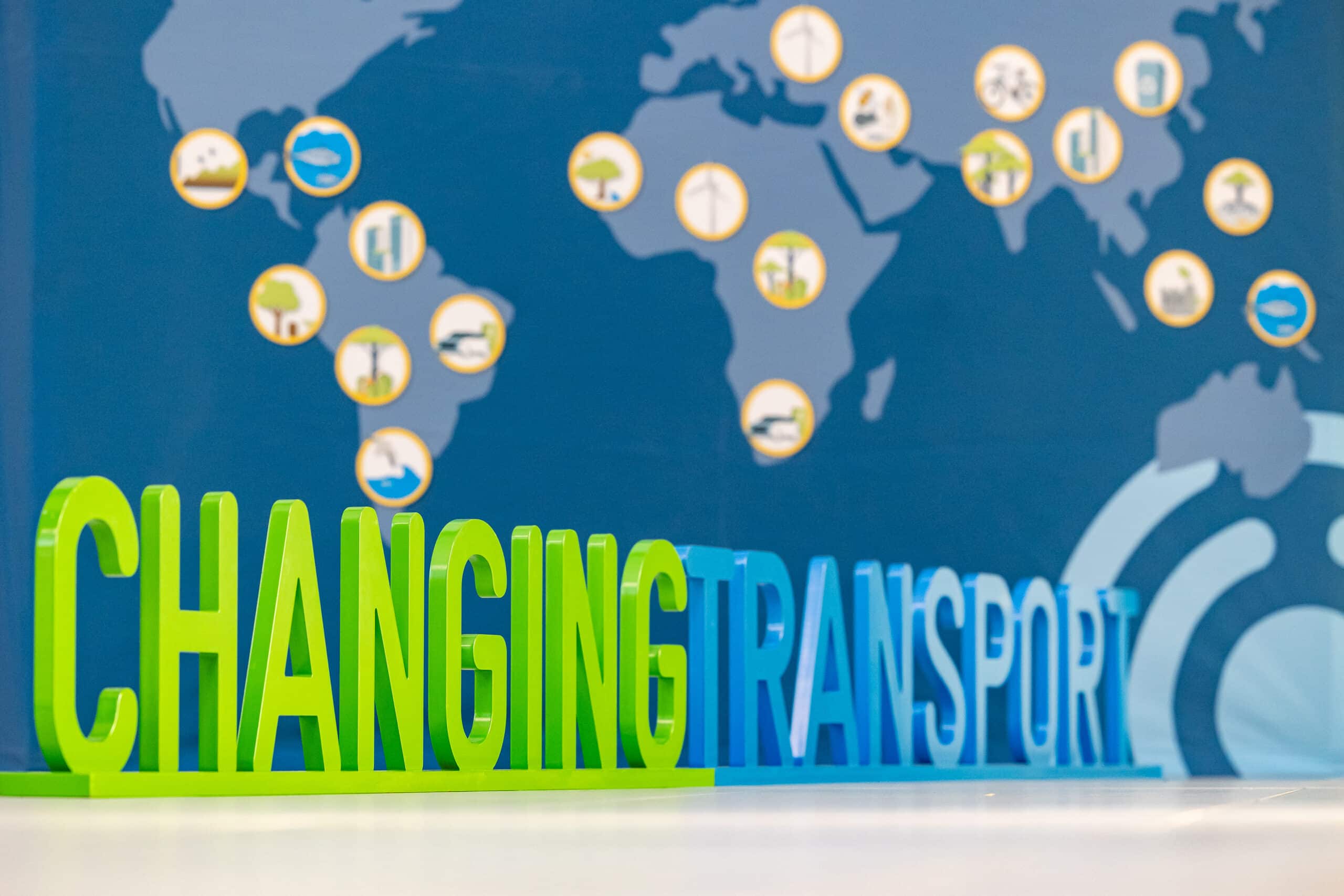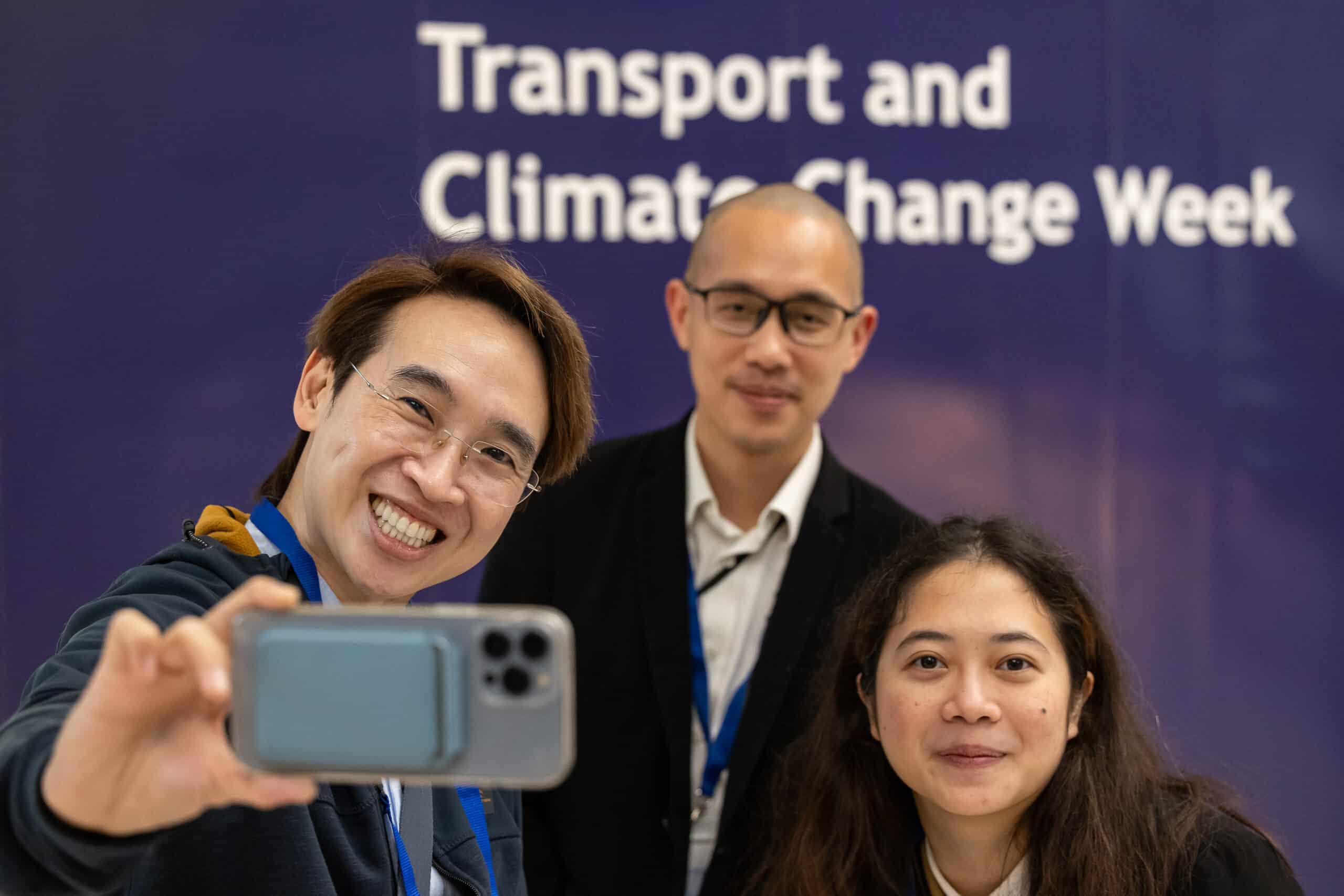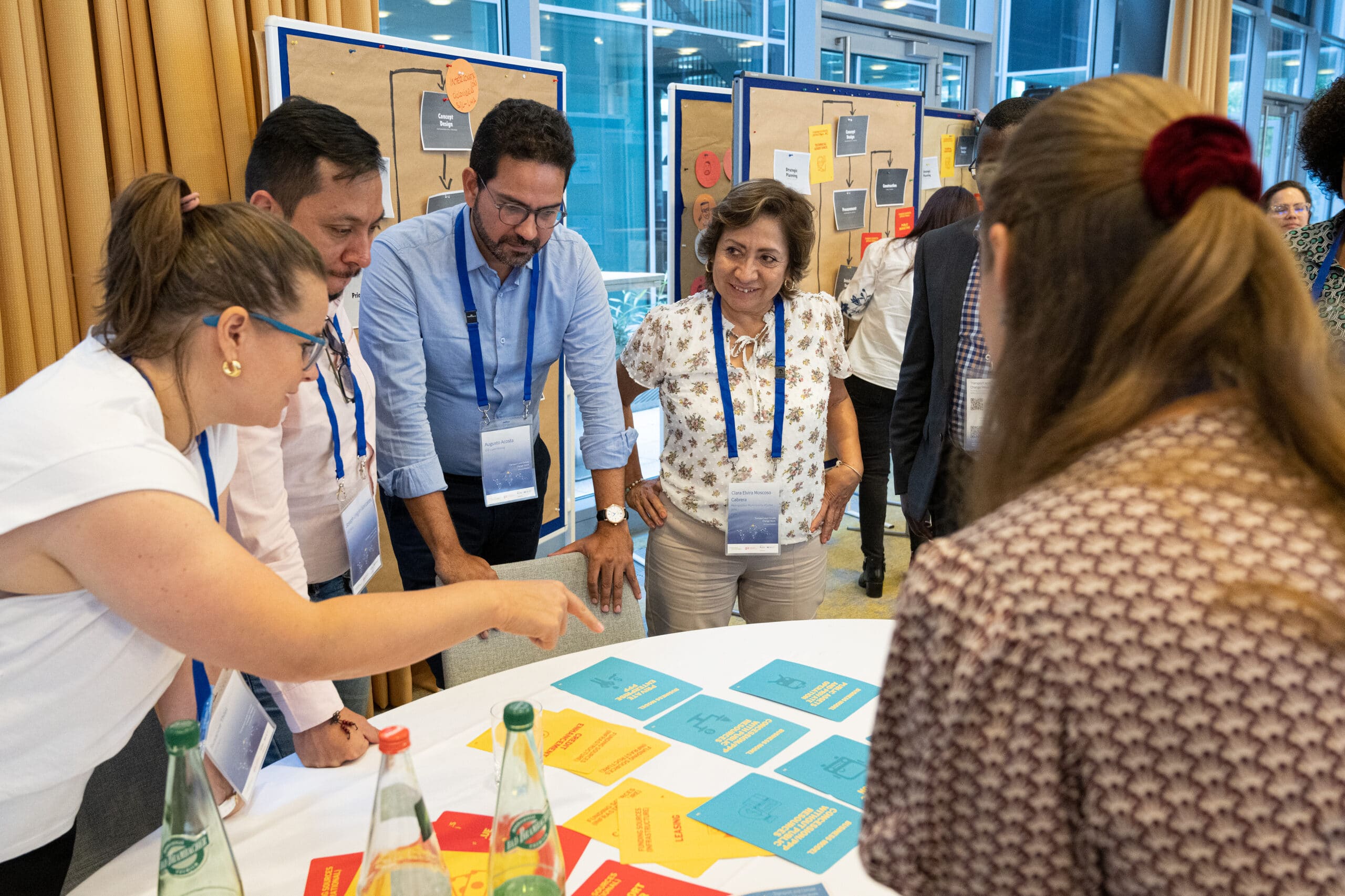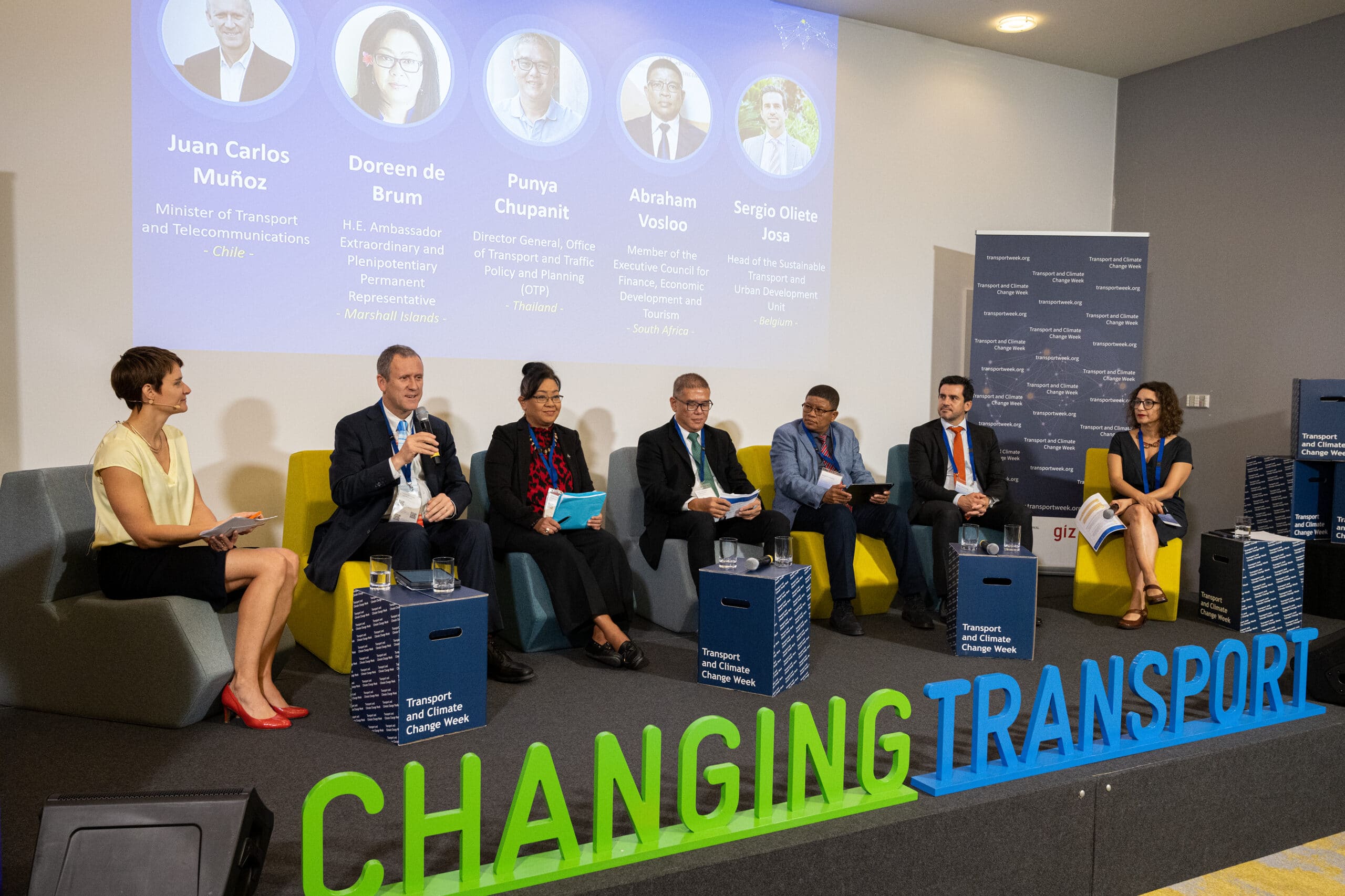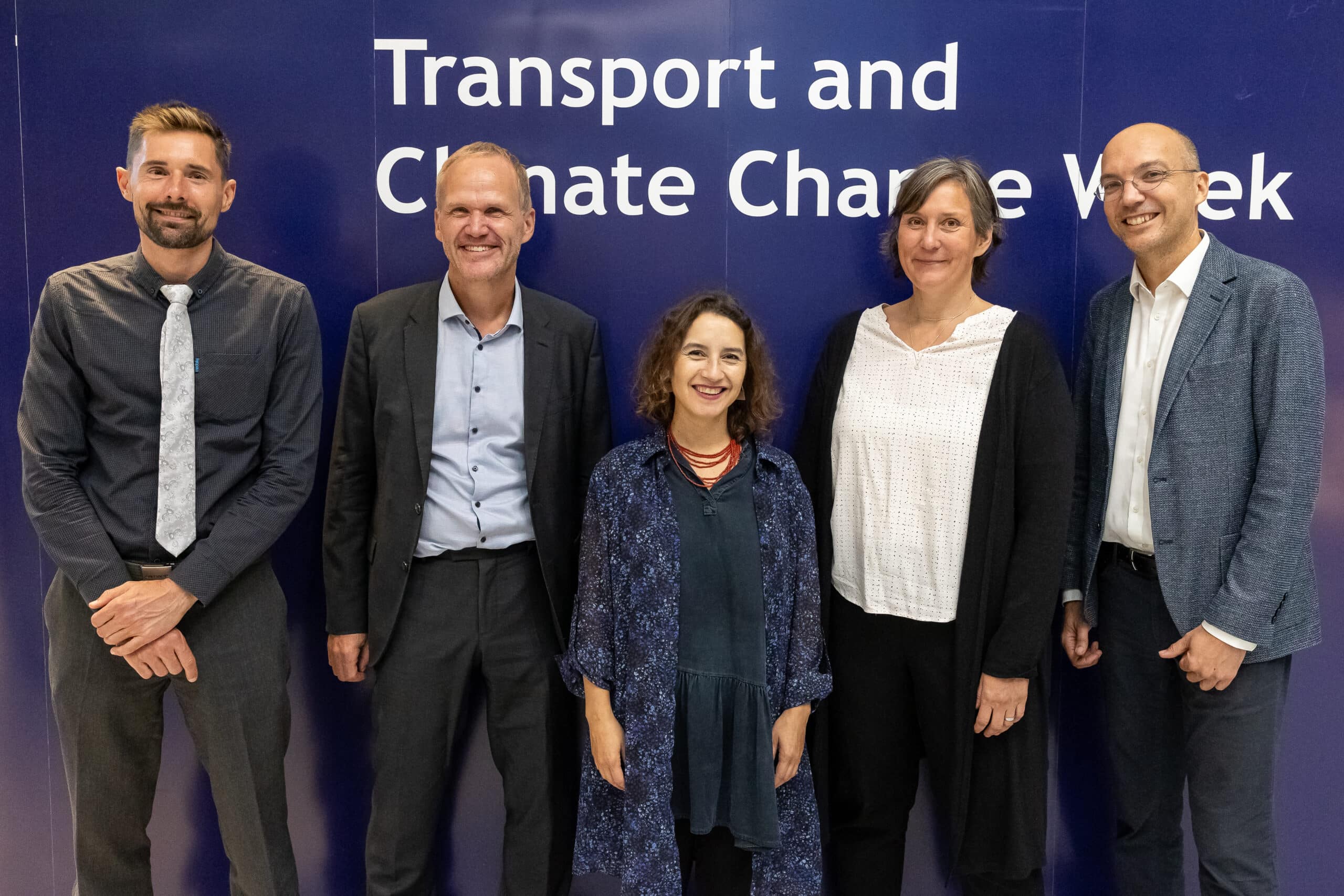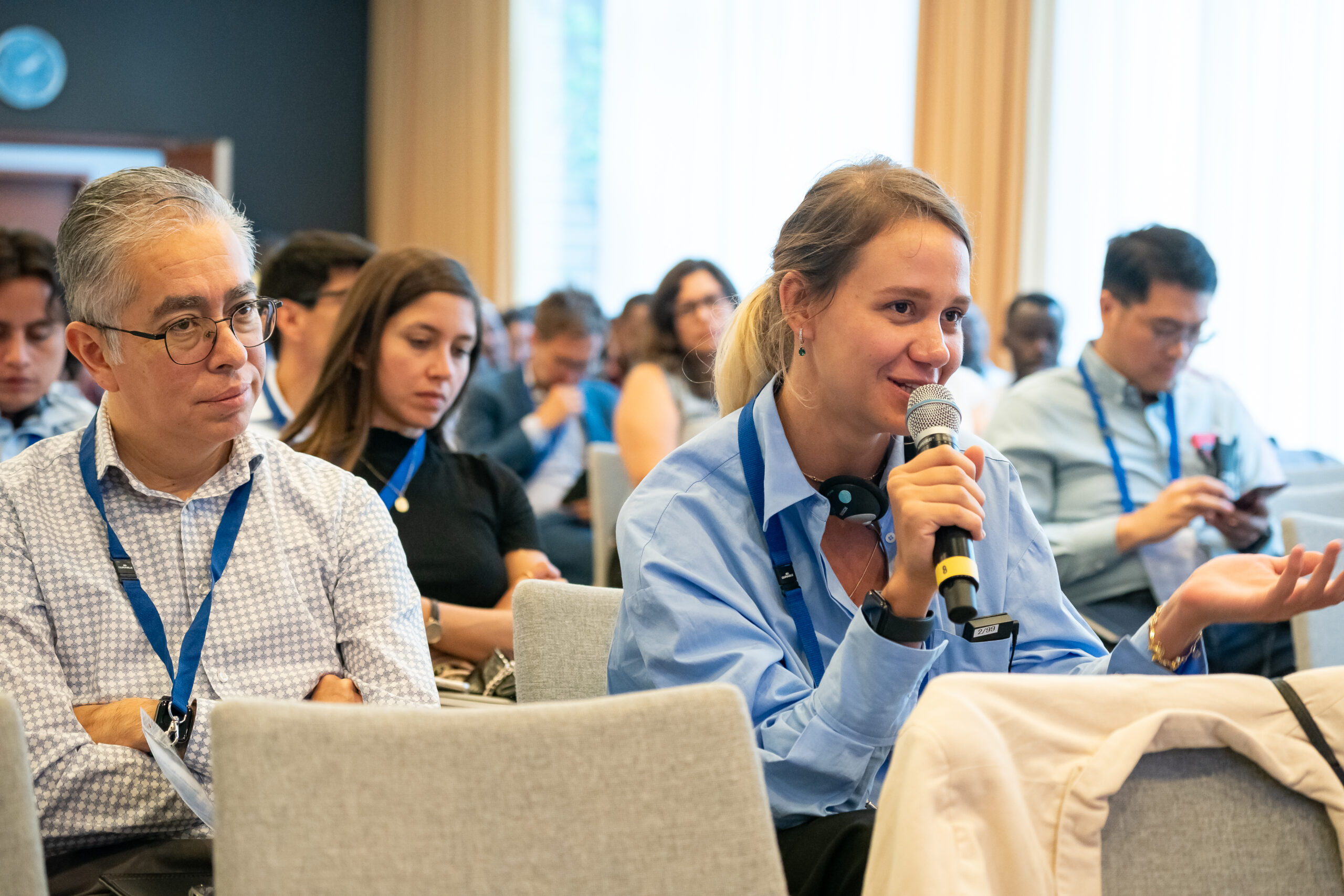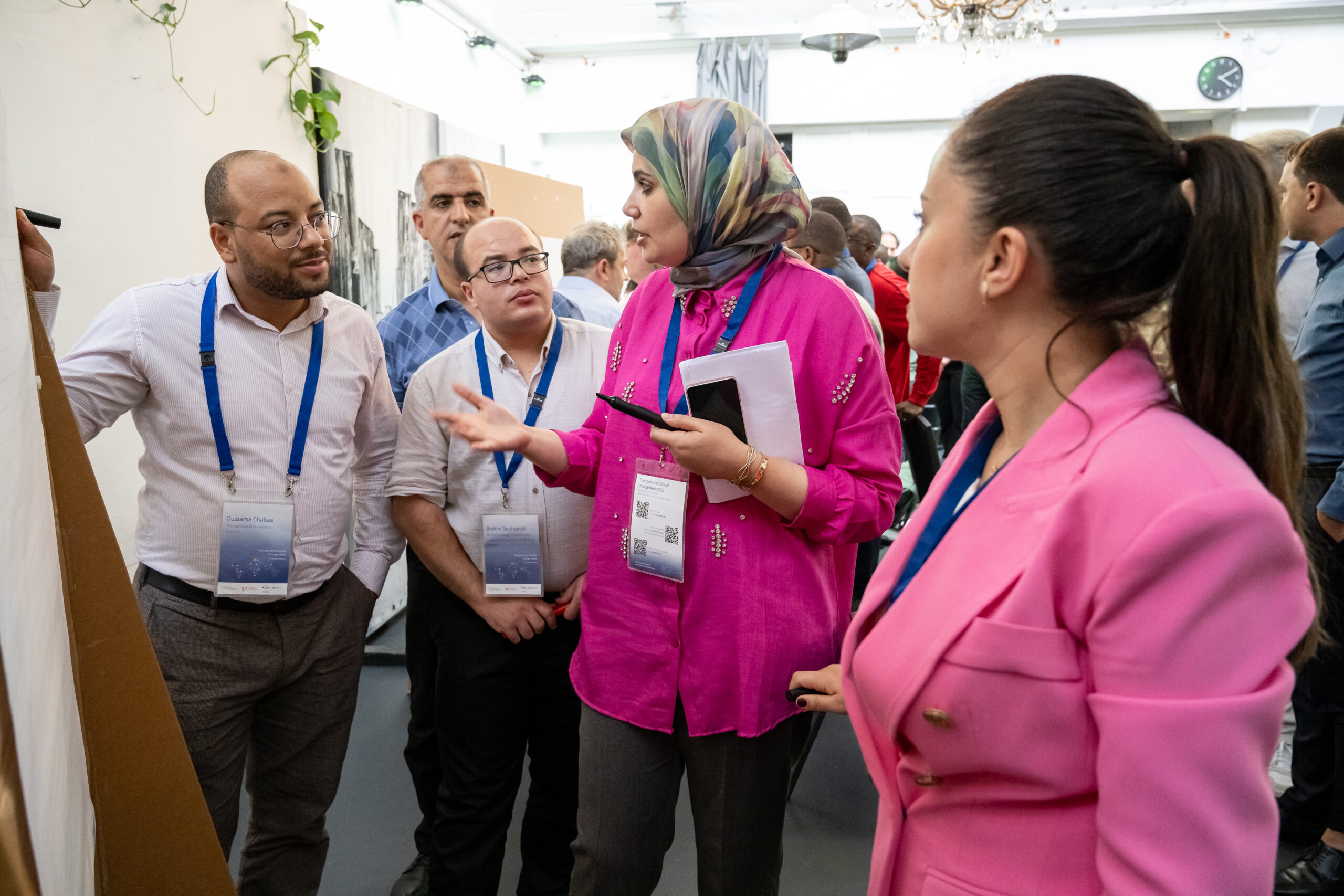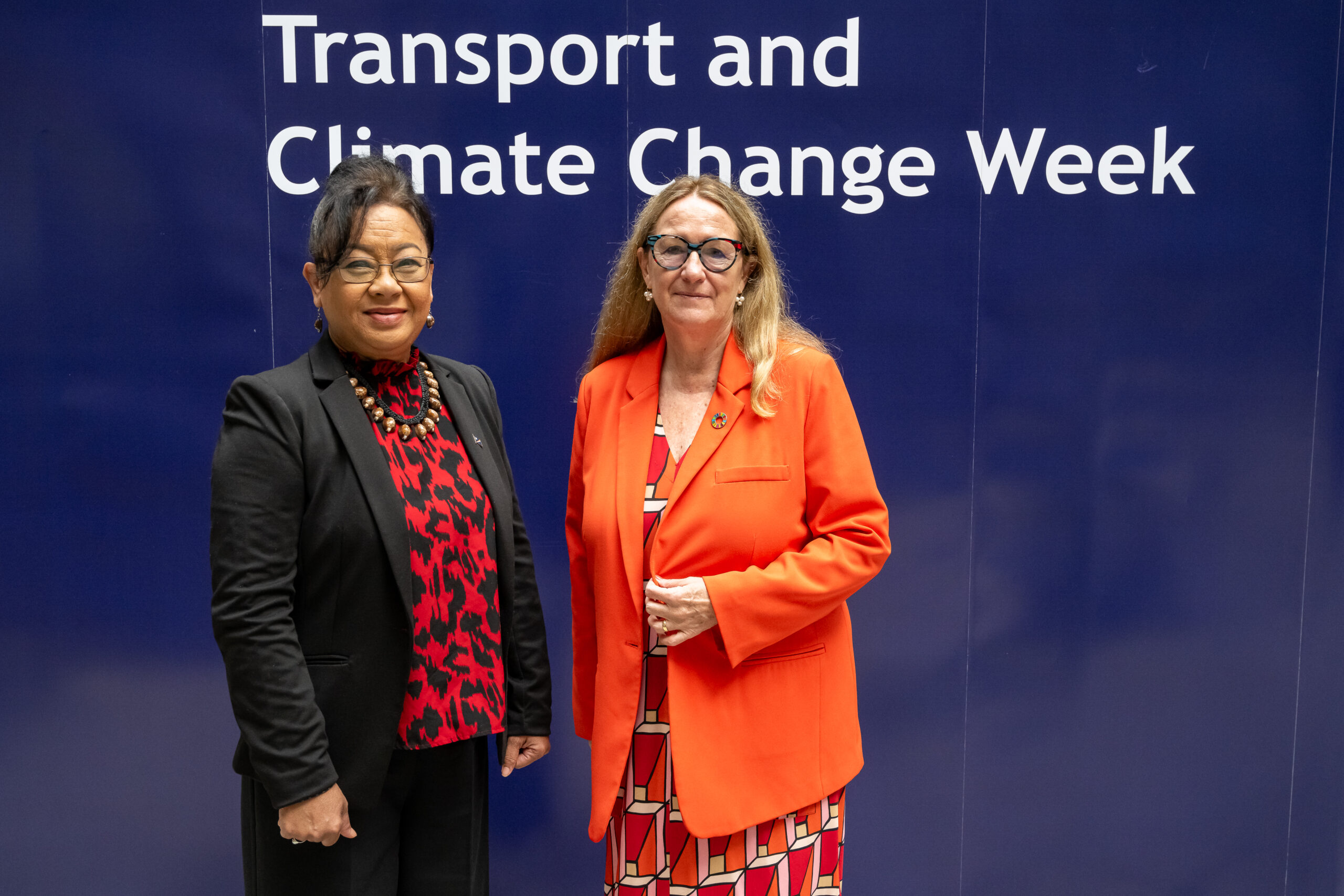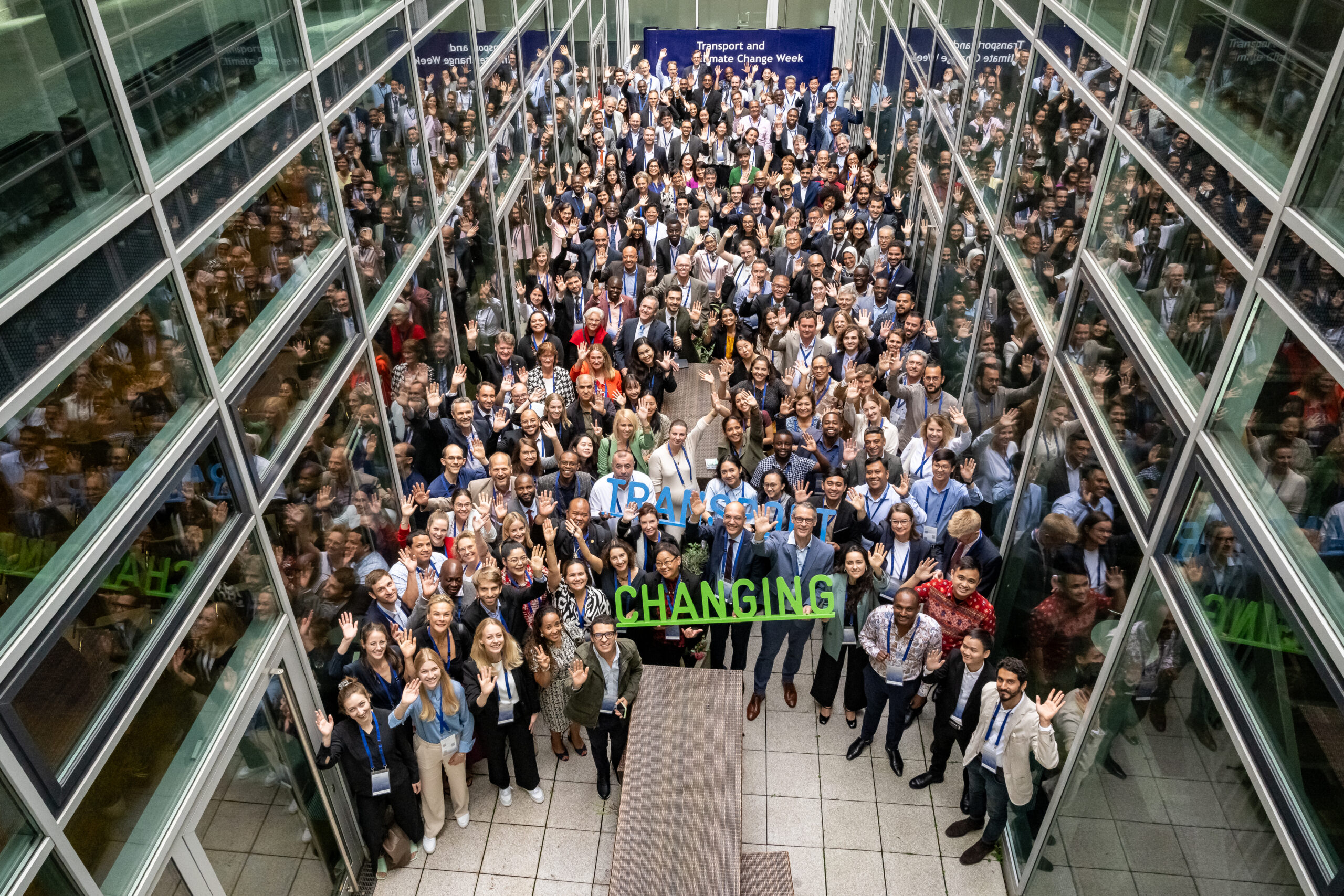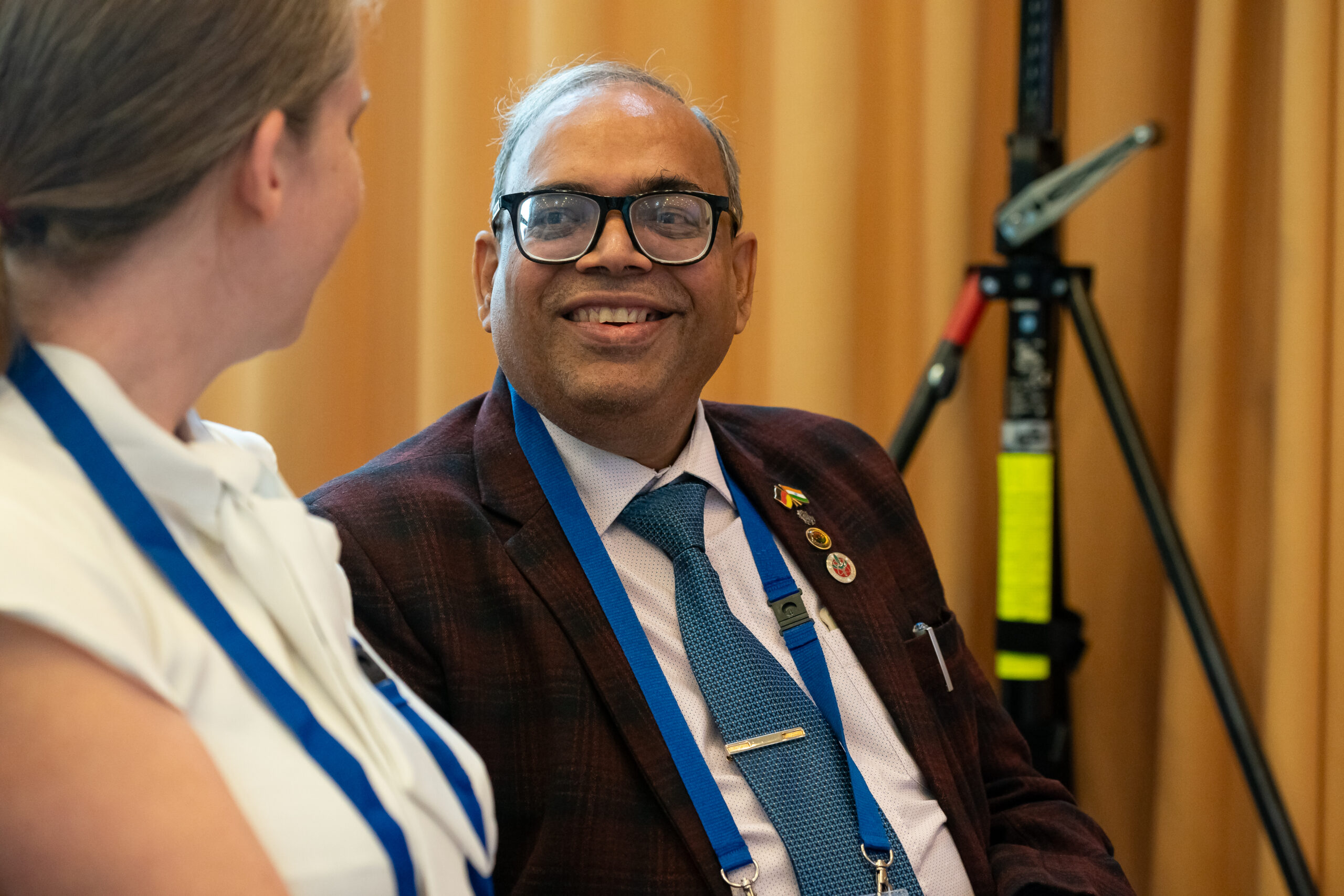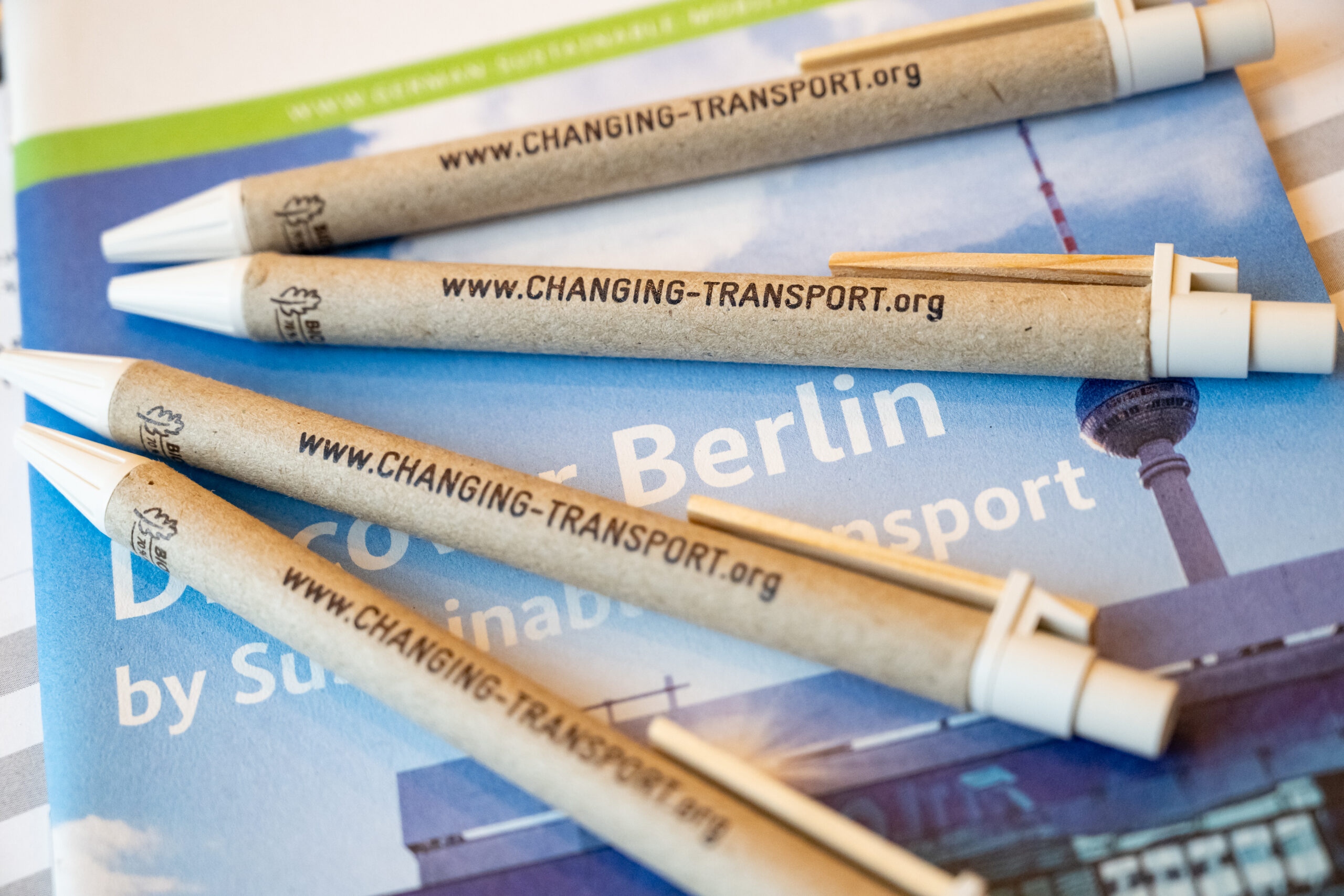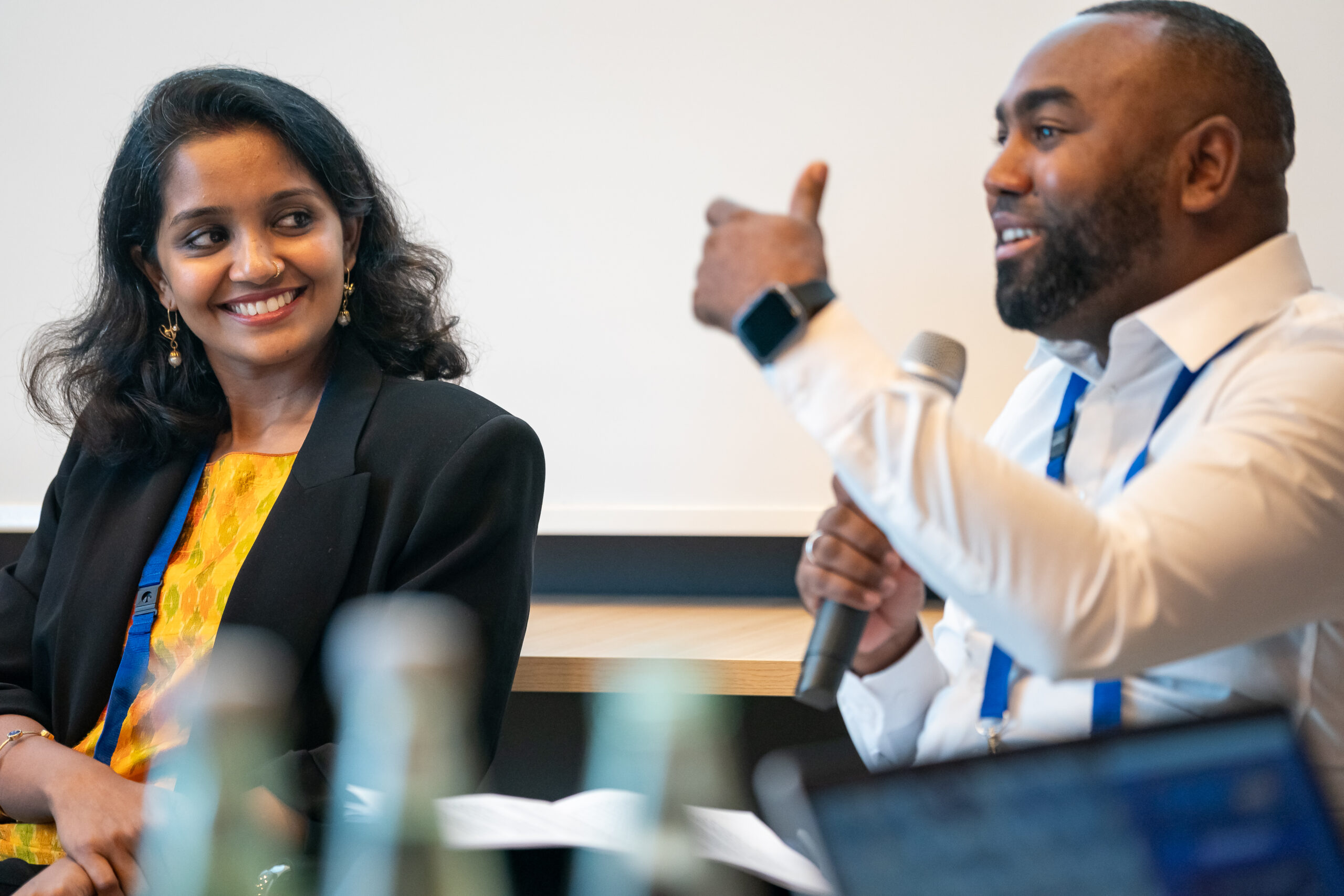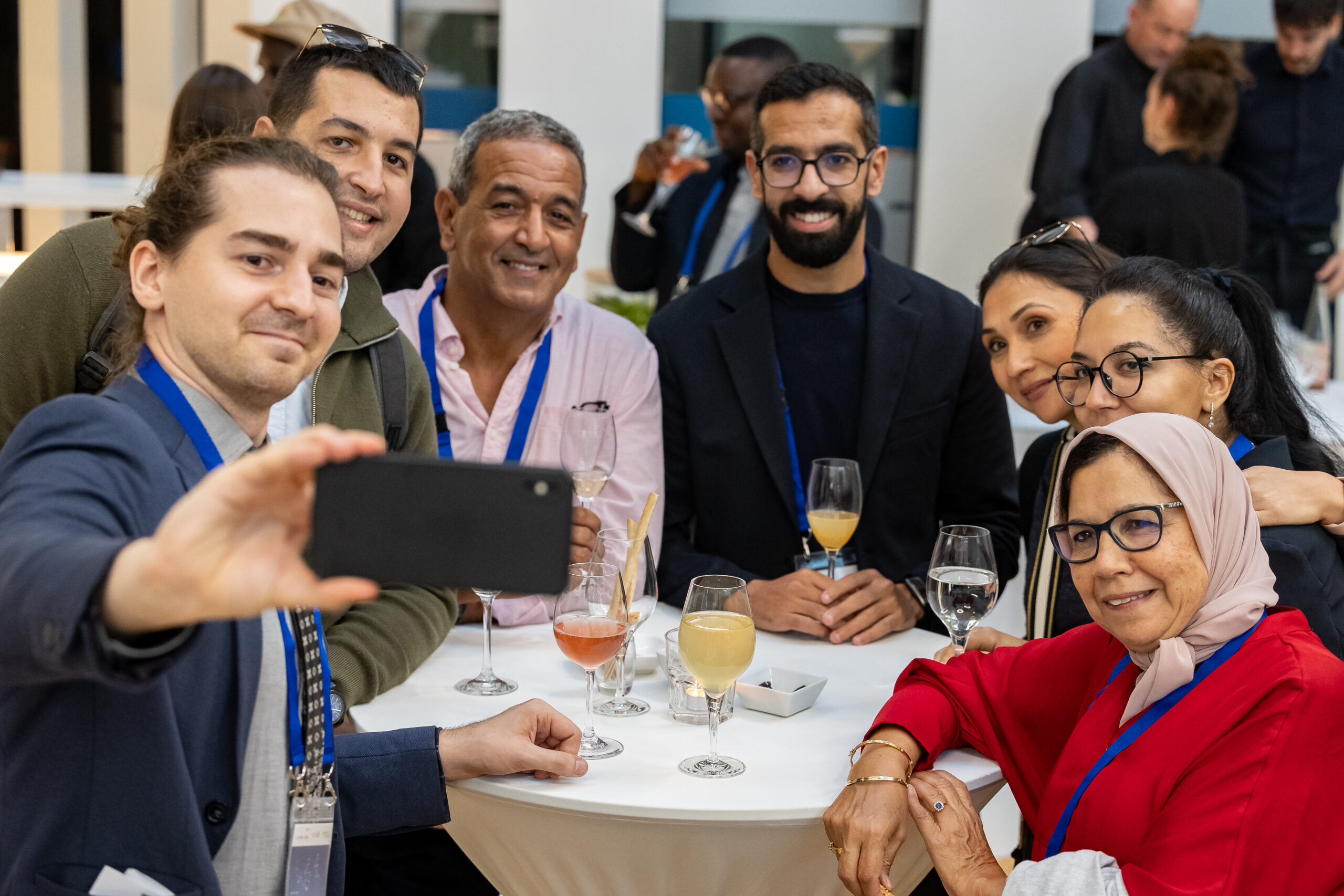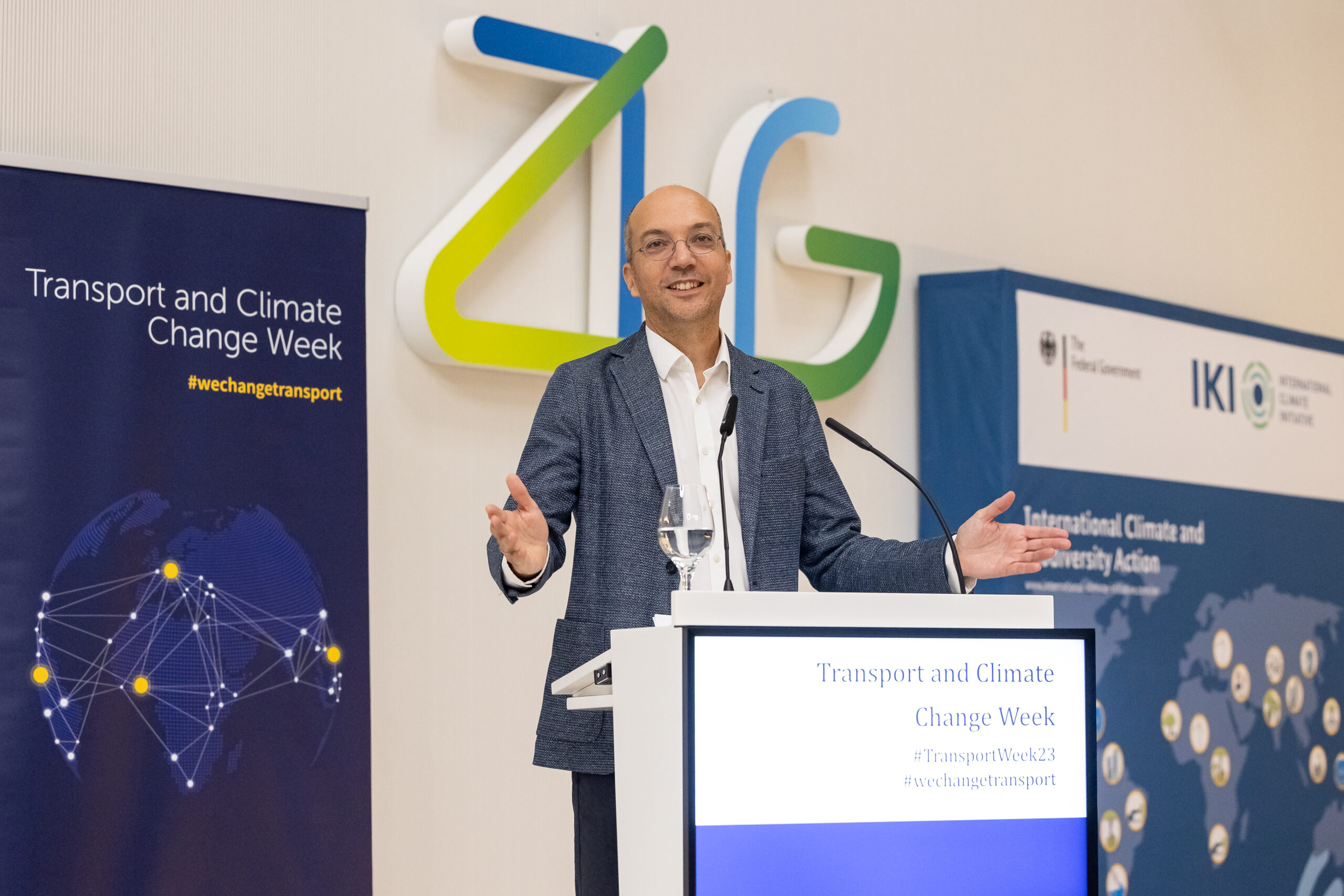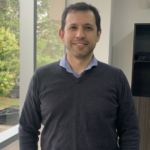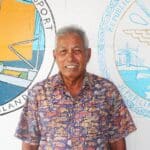Welcome to Transport and Climate Change Week 2025
From 22 to 26 September 2025, we are creating a space for conducting a review of past activities and for facilitating future accountability as a community. By showcasing our achievements, we aim to emphasize positive outcomes that inspire collective momentum and drive meaningful transformation.
This year’s event is by invitation only. For further information, please contact your GIZ focal point.
Programme overview
Understanding & Mapping the System
Welcome & opening
Opening ceremony of Transport and Climate Change Week 2025, introduction of the concept and objectives proposed for this edition. Welcoming greetings and start of the conference. This year we are reaching a decade from the Paris agreement, at the opening, we will reflect on how the decade has challenged us and given us opportunities to innovate and collaborate on the pathway to achieve a net-zero transport.
Guided introduction of delegates
As the heart of the Transport and Climate Change Week is peer-exchanges, the most important moment is the introduction of who has come, from where they are coming and their expertise and challenges steering transport transformation. In this interactive session, we will give the chance to start a meaningful conversation that will unfold during the week.
Be inspired by Africa

Ababacar Fall
Directorate General of Road Transport, Ministry of Infrastructure, Road and Air Transport of Senegal
Visit profile

Racheal Wanyamawi
State Department for Transport, Ministry of Road and Transport of Kenya
Visit profile
This session will be in the format of a moderated panel session. It will begin with a short introductory video showcasing ongoing initiatives with local voices from the region. This will be followed by a round of self-introduction from the heads of delegation/representatives of the (7) African countries represented in the panel. The moderator will then ask a question or two (depending on time availability) to each panelist. The questions will be provided by GIZ colleagues working on respective country projects and will seek to amplify key successes (or points of celebration) from their ongoing activities. A QR code with a link to publications by respective countries is being developed.
Key note speaker
Artificial intelligence (AI) is rapidly changing how we understand, design, and govern transport systems. In this keynote, Prof. Dr. Hamid Mostofi, professor of Data Science and AI at SRH Berlin University of Applied Sciences and senior researcher at TU Berlin, will explore the transformative role of AI in shaping sustainable transport policies. Drawing on his research in diverse socio-economic contexts, he will highlight how AI enables better data use for evidence-based decision-making while addressing social acceptance, perceptions, and equity concerns. The session will offer both a retrospective on progress since the Paris Agreement and a forward-looking perspective on how AI can act as a driver for more inclusive, effective, and sustainable transport policies worldwide.
Introducing Trainings
The in-person format of Transport Week has extended trainings to enable collective learning and leading the conversation to deeper content. As the four trainings are running in parallel, this session seeks to introduce and pitch them to be known by visitors and country delegations. The purpose is to showcase rational behind and learning objectives of each one.
Training 1

Felix Kirsch
German Federal Ministry for the Environment, Nature Conservation, Nuclear Safety and Consumer Protection
Visit profile
In this training country delegates will gain hands-on knowledge from experts and practitioners on different policy options to enhance vehicle efficiency and foster electrification, such as fuel economy standards and vehicle taxes (feebates).
In an interactive approach, the training will address the different steps that have to be taken in order to drive these policies ready for implementation. The training will focus on the experiences made in the countries and address common challenges such as data availability and quality, the development of monitoring and compliance schemes and the difficult dialogue with the automotive industry.
It will facilitate peer learning among participants and provide an opportunity to exchange with international experts.
Training 2
This 1.5-day training brings together transport professionals from the Global South to collaboratively address the opportunities and challenges of electric bus (e-bus) deployment. Grounded in peer-to-peer learning, participants will exchange experiences, reflect on country-specific barriers, and co-develop actionable solutions for accelerating the e-bus transition.
Through a mix of expert inputs, interactive group exercises, and peer case sharing from Paraguay, Kenya, Nigeria, Colombia and Germany, the training provides a comprehensive journey from understanding governance structures and stakeholder landscapes, to exploring financing strategies, and finally, to developing implementation roadmaps.
Training 3
Paratransit systems form the backbone of urban mobility in many cities of the Global South. These informal and semi-formal transport services, such as minibuses, tuk-tuks, jeepneys, and shared taxis, play a crucial role in connecting millions of people to jobs, education, and essential services. Decarbonisation could be one of the ultimate objectives when reforming paratransit, which is a significant contributor to urban transport emissions, even though precise data is often lacking. Rather than focusing solely on vehicle technology as the primary solution, this training will present a more holistic approach. This includes a better understanding of the climate impact of paratransit reforms, guided by the comprehensive EASI (Enable, Avoid, Shift, Improve) Framework.
Training 4
Unlock the tools to transform urban mobility. This dynamic 1.5-day training equips city officials, transport planners, and financial experts with the knowledge to finance and scale sustainable public transport and electric mobility solutions. Participants will gain practical insights into project preparation, funding mechanisms, and innovative investment models—essential for navigating the complexities of climate-aligned infrastructure. Through expert-led sessions and hands-on exercises, attendees will leave with actionable strategies to attract funding, improve financial sustainability, and accelerate low-carbon transport initiatives.
Spotlighting Proven Transformation Strategies
Be inspired by cities experiences

Liana Nersisyan
Environmental Project Implementation Unit State Agency of the Ministry of Environment of the Republic of Armenia
Visit profile
Transforming climate-friendly cities is a task of multi-level governance and wide stakeholder engagement. Rapid urbanisation, rising transport demand, and growing air pollution place significant pressure on urban environments, while also offering opportunities for transformation. Local and national initiatives across regions show how transformative strategic intervention and projects can cut emissions, improve air quality, and deliver wider environmental and social benefits.
This will be captured in the session “Cities by Experience”, bringing together representatives from Albania, Uzbekistan, Armenia, Jordan, and Lebanon to showcase their journeys in transforming cities with the support and technical assistance of development partners. The session will entail a round of presentations per each country, sharing practical results and lessons learned in responding to climate and mobility challenges in their own context.
Through short presentations and an interactive discussion, participants will gain insights into how diverse regional experiences can inform more inclusive, resilient, and environmentally sound approaches to urban mobility and climate action.
Training 1

Felix Kirsch
German Federal Ministry for the Environment, Nature Conservation, Nuclear Safety and Consumer Protection
Visit profile
In this training country delegates will gain hands-on knowledge from experts and practitioners on different policy options to enhance vehicle efficiency and foster electrification, such as fuel economy standards and vehicle taxes (feebates).
In an interactive approach, the training will address the different steps that have to be taken in order to drive these policies ready for implementation. The training will focus on the experiences made in the countries and address common challenges such as data availability and quality, the development of monitoring and compliance schemes and the difficult dialogue with the automotive industry.
It will facilitate peer learning among participants and provide an opportunity to exchange with international experts.
Training 2
This 1.5-day training brings together transport professionals from the Global South to collaboratively address the opportunities and challenges of electric bus (e-bus) deployment. Grounded in peer-to-peer learning, participants will exchange experiences, reflect on country-specific barriers, and co-develop actionable solutions for accelerating the e-bus transition.
Through a mix of expert inputs, interactive group exercises, and peer case sharing from Paraguay, Kenya, Nigeria, Colombia and Germany, the training provides a comprehensive journey from understanding governance structures and stakeholder landscapes, to exploring financing strategies, and finally, to developing implementation roadmaps.
Training 3
Paratransit systems form the backbone of urban mobility in many cities of the Global South. These informal and semi-formal transport services, such as minibuses, tuk-tuks, jeepneys, and shared taxis, play a crucial role in connecting millions of people to jobs, education, and essential services. Decarbonisation could be one of the ultimate objectives when reforming paratransit, which is a significant contributor to urban transport emissions, even though precise data is often lacking. Rather than focusing solely on vehicle technology as the primary solution, this training will present a more holistic approach. This includes better understanding the climate impact of paratransit reforms, guided by the comprehensive EASI (Enable, Avoid, Shift, Improve) Framework.
Training 4
Unlock the tools to transform urban mobility. This dynamic 1.5-day training equips city officials, transport planners, and financial experts with the knowledge to finance and scale sustainable public transport and electric mobility solutions. Participants will gain practical insights into project preparation, funding mechanisms, and innovative investment models—essential for navigating the complexities of climate-aligned infrastructure. Through expert-led sessions and hands-on exercises, attendees will leave with actionable strategies to attract funding, improve financial sustainability, and accelerate low-carbon transport initiatives.
Be Inspired by Latin America
“Shared Routes: Stories of Change from Latin America” is a dynamic session showcasing concrete progress in sustainable urban mobility across Latin America. Through a moderated panel with delegates from various countries, the session explores regional challenges, innovative solutions, and replicable policies. Interactive rounds and live audience engagement to open dialogue and inspiration to connect with the region’s shared journey toward more sustainable, inclusive, and resilient mobility systems.
Training 1

Felix Kirsch
German Federal Ministry for the Environment, Nature Conservation, Nuclear Safety and Consumer Protection
Visit profile
In this training country delegates will gain hands-on knowledge from experts and practitioners on different policy options to enhance vehicle efficiency and foster electrification, such as fuel economy standards and vehicle taxes (feebates).
In an interactive approach, the training will address the different steps that have to be taken in order to drive these policies ready for implementation. The training will focus on the experiences made in the countries and address common challenges such as data availability and quality, the development of monitoring and compliance schemes and the difficult dialogue with the automotive industry.
It will facilitate peer learning among participants and provide an opportunity to exchange with international experts.
Training 2
This 1.5-day training brings together transport professionals from the Global South to collaboratively address the opportunities and challenges of electric bus (e-bus) deployment. Grounded in peer-to-peer learning, participants will exchange experiences, reflect on country-specific barriers, and co-develop actionable solutions for accelerating the e-bus transition.
Through a mix of expert inputs, interactive group exercises, and peer case sharing from Paraguay, Kenya, Nigeria, Colombia and Germany, the training provides a comprehensive journey from understanding governance structures and stakeholder landscapes, to exploring financing strategies, and finally, to developing implementation roadmaps.
Training 3
Paratransit systems form the backbone of urban mobility in many cities of the Global South. These informal and semi-formal transport services, such as minibuses, tuk-tuks, jeepneys, and shared taxis, play a crucial role in connecting millions of people to jobs, education, and essential services. Decarbonisation could be one of the ultimate objectives when reforming paratransit, which is a significant contributor to urban transport emissions, even though precise data is often lacking. Rather than focusing solely on vehicle technology as the primary solution, this training will present a more holistic approach. This includes better understanding the climate impact of paratransit reforms, guided by the comprehensive EASI (Enable, Avoid, Shift, Improve) Framework.
Training 4
Unlock the tools to transform urban mobility. This dynamic 1.5-day training equips city officials, transport planners, and financial experts with the knowledge to finance and scale sustainable public transport and electric mobility solutions. Participants will gain practical insights into project preparation, funding mechanisms, and innovative investment models—essential for navigating the complexities of climate-aligned infrastructure. Through expert-led sessions and hands-on exercises, attendees will leave with actionable strategies to attract funding, improve financial sustainability, and accelerate low-carbon transport initiatives.
Symposium Day: Visualising Our Goals
Opening
Welcoming a broader participation, Symposium is the summit of each Transport and Climate Change Week. This year we initiate a new chapter moving us forward to the next decade. We plan to advocate towards the importance of having a renewed target for the transport sector related to NDCs. We are extending the network and promoting innovation via learning from countries’ stories of change.
Panel

Rita Schwarzelühr-Sutter
German Federal Ministry of Environment, Climate Action, Nature Con-servation and Nuclear Safety (BMUKN)
Visit profile

Yin Zhenjun
Water Transport Planning Division, Department of Comprehensive Planning, MoT
Visit profile
Achieving zero emission transport by mid-century is a prerequisite for achieving the Paris Climate Agreement and avert most dangerous climate change. Following the cycle of Paris Agreement, this year is the time to submit new Nationally Determined Contributions to the UNFCCC. This has given countries an opportunity to revise targets, set up new measures and refine their plans for the five years to come.
The session will discuss how countries’ progress can be tracked and which next steps countries have planned for their transition to decarbonized transport systems.
This session will feature participants from Germany, Latin America, Asia and Africa.
Be inspired by the Marshall Islands

Phil Philippo
Ministry of Transportation, Communication and Information Technologies of the Republic of the Marshall Islands
Visit profile

H.E. Albon T. Ishoda
Ministry of Foreign Affairs and Trade of the Republic of the Marshall Islands
Visit profile
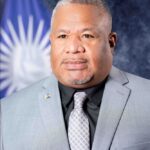
Hon. Minister Hilton T. Kendall
Ministry of Transportation, Communication and Information Technologies of the Republic of the Marshall Islands
Visit profile
This session showcases the Republic of the Marshall Islands’ pioneering leadership in low-carbon shipping, blending ancient seafaring heritage with cutting-edge innovation.
From the shores of Majuro to the halls of the IMO in London, the RMI is fighting for climate justice and a resilient future. The Ministerial delegation — including senior leaders from the Ministry, the Marshall Islands Shipping Corporation, and the Presidential Special Envoy for Maritime Affairs and Ambassador — will share their experiences in championing decarbonisation at home and on the international stage.
Most probably the farthest-travelled delegation at this event, they bring insights gathered over more than 13,000 kilometers of shared commitment. Through inspiring stories, practical lessons, and a vision for Pacific cooperation, this session combines video storytelling, keynote reflections, and open dialogue.
Panel

Disi Li
International Cooperation and Exchange Center, Global Sustainable Transport Innovation and Knowledge Center (GSTIKC)
Visit profile

Karim Ben Amara
Department of Road Transport, Ministry of Transport and Logistics of Morocco
Visit profile
The global automotive sector stands at a turning point. With electric vehicles (EVs) at the centre of the dual energy and transport transition, countries are adapting their industrial policies to strengthen and expand their role and capacities along EV value chains. This panel brings together international perspectives, from Morocco, China, Kenya, Germany, and the United Nations Environment Programme (UNEP), to explore how investment strategies, decarbonisation efforts, and policy coordination are shaping the next phase of the automotive industry.
China is the world’s largest automotive market and EV producer, setting global benchmarks through its policies and supply chain reach. Morocco has emerged as a rising international hub for automotive manufacturing, particularly in EV components and battery value chains, while also developing ambitious policies for the electrification of domestic vehicle fleets. Kenya is positioning itself as a regional frontrunner in EV assembly and adoption within Sub-Saharan Africa, leveraging policy incentives, foreign investment, and local innovation. Germany is Europe’s largest automotive market in terms of both production and sales, with a growing uptake of EVs coupled with support for innovation and infrastructure. Together, they reflect regional diversity and differing stages of value chain integration, innovation, and investment. The UNEP is engaged globally in the promotion of clean fuels, stricter emission standards, and electric mobility to limit pollution and align the global automotive industry with climate goals.
Christian Hochfeld, Director of Agora Verkehrswende, one of the leading think tanks promoting transport transformation globally, will moderate the session, contextualising the discussion with expert insight into the technical, policy, and sustainability dimensions.
Be inspired by Asia

Adimas Satriyo
Directorate of Road Transport, Ministry of Transportation of the Republic of Indonesia
Visit profile

Hang Nguyen Thi Thu
Department of Science, Technology, Environment, and Construction Materials, Ministry of Construction of Viet Nam
Visit profile

Yafei Li
Comprehensive Transport Service Division, Department of Transport Services, MoT
Visit profile
Countries in Asia emit around 38% of global domestic transport emissions and they are growing faster than in any other region. On the other hand, there are first signs of decoupling as emissions have grown much slower (1%) than overall GDP (6.5%) since 2015. At the same time, Asia is the powerhouse of electric mobility.
This session will dive into the dynamic developments of transport decarbonisation in the most populous, very divers and in many ways most advanced region in the world. Listen to local voices as they provide snapshots from China, Indonesia, the Philippines, and Vietnam.
Side Event by CCG
This interactive session introduces participants to the Data-to-Deal (D2D) approach for building robust, low-carbon transport pathways that can attract climate finance. Using real-world examples and hands-on exercises, participants will explore how to translate transport-energy strategies into actionable investment pipelines. The training will equip attendees with tools to develop “ambition levers” using the Avoid–Shift–Improve framework and an impression of the value of modelling scenarios using the D2D analytical workflow. The session will also introduce opportunities for free training courses in the D2D and transport decarbonisation.
This session is ideal for professionals in policy, planning or research: it bridges the gap between decarbonisation goals and investment, offering practical steps for mobilising resources in the transport sector.
Side Event by World Resources Institute (WRI) and GIZ

Lei Cao
Road Freight Transport Management Division, Department of Transport Services, MoT of China
Visit profile
Freight transport accounted for ca. 40% of global transport emissions and the biggest driver of emissions growth in the sector. In China, the adoption of electric trucks is gaining momentums. By 2024, zero-emission heavy-duty trucks (above 12t) represented about 14% of new heavy-duty truck sales (The ICCT, 2025). However, barriers continue to hinder their broader uptake, like high upfront costs, patchy charging network, limited ranges, and others. In Germany, while similar concerns persist, policies such as exemption from road toll and concrete plans for charging network expansion are incentivising electric trucks.
This session will provide a snapshot of e-truck developments in China and Germany and a discussion with experts from other countries and participants on how to accelerate the deployment of electric trucks across different segments.
Side Event by ICLEI
Mobility is at a turning point. On the ground, cities are reclaiming space for walking, cycling, and public transport. And in the digital world, new technologies are transforming how trips are planned, paid for, and experienced. These parallel paradigm shifts, physical and technological, offer a rare chance to build cities where sustainable and people-cantered mobility converge. Asian cities are at the forefront of those paradigm shifts due to the growing population, and the fast advancement in digitalization.
This panel brings together voices from research, Asian public authorities, and policy experts to ask: how do we design cities where technology and active mobility reinforce each other, and how can public participation guide both streets and screens toward more inclusive futures?
Side Event by SLOCAT
2025 is a decisive year to renew multistakeholder cooperation and scale up knowledge-driven policies and investments that make transport systems more inclusive, economically viable, environmentally responsible, and resilient.
This year marks several critical milestones: it’s the five-year countdown until the 2030 Sustainable Development Goals (SDGs) deadline and the Intergovernmental Panel on Climate Change’s (IPCC) target to halve emissions. It marks the 10th anniversary of the Paris Agreement. By the time the international community gathers at COP30 in Belém, Brazil, countries are expected to present new Nationally Determined Contributions (NDCs) with emissions reductions targets and actions through 2035. And in January 2026, the first-ever UN Decade of Sustainable Transport 2026-2035 will start.
This interactive side event will bring together transport professionals to:
Reflect on how the Paris Agreement and the SDGs have shaped day-to-day practice in the sector.
Share lessons from the transport dimensions of past NDCs, and define their needs to effectively shape and implement the next generation of NDCs through a transport lens.
Explore their expectations for international and national collaboration to sharpen near-term transport priorities and long-term pathways over the next decade.
Participants will engage in short, focused peer-to-peer dialogues to exchange experiences, highlight needs, and identify opportunities for collaboration that help us move from commitment to delivery — advancing transport transformations that serve both people and the planet.
Side Event by AFD and MobiliseYourCity
This side-event will explore how cities can integrate climate change adaptation into Sustainable Urban Mobility Plans (SUMPs) and will showcase the knowledge products developed by MobiliseYourCity and Resallience with support from the French government (ADEME). Participants will gain insights into global strategies and case studies, with a focus on practical approaches for local governments and practitioners to strengthen resilience of urban mobility systems, ensure accessibility and equity, and respond effectively to climate-related risks.
Side Event by Agora Verkehrswende
Across Africa, a diverse group of organisations including think tanks and policy research institutions are working to address the challenges of sustainable transport and climate-neutral mobility. However, until recently, little was known about the capacities, operational challenges and collaboration amongst these organizations. The Joining Knowledge forces for Sustainable Transport Policy in Africa report (1st Edition), commissioned by Agora Verkehrswende and the Deutsche Gesellschaft für Internationale Zusammenarbeit (GIZ) under the Rethinking Transport in Africa project, provides the first comprehensive overview of this ecosystem, assessing their capacities, thematic focus areas, governance structures, funding sources, and policy influence.
This panel discussion will bring together leading African think tank representatives, transport policy experts, and international development partners to reflect on the report’s findings. Panellists will share insights on the strengths and gaps in the current landscape, highlight innovative approaches to policy engagement, and explore pathways for deeper collaboration within and across regions. Special attention will be given to opportunities for building a community that can amplify African perspectives in global sustainable transport dialogues and help shape locally relevant solutions for climate action in the transport sector.
Enhancing Accountability
After four days of technical learning at Transport and Climate Change Week, join us for a fast-paced and fun session that combines an engaging Walk of Privilege exercise, quizzes, and group reflections to explore the powerful link between gender, social inclusion, and sustainable transport. Together, we will uncover how:
• Inclusive features — such as lighting, accessible design, and safety measures—not only benefit women and vulnerable groups but also encourage broader public transport use.
• Women’s travel behaviours and choices can drive decarbonisation efforts, with a shift to public and active mobility contributing significantly to emissions reduction.
• Gender-sensitive planning is not an added cost but rather a strategic investment in improving modal shift, resilience, and the effectiveness of sustainable transport systems.
This session will be refreshing, participatory, and thought-provoking, encouraging cross-regional knowledge exchange while keeping the tone light, fun, and interactive.
Regional Exchange Asia

Hang Nguyen Thi Thu
Department of Science, Technology, Environment, and Construction Materials, Ministry of Construction of Viet Nam
Visit profile
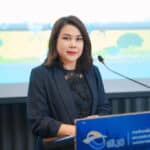
Chutinthorn Mankhong
Office of Transport and Traffic Policy and Planning (OTP) of Thailand
Visit profile
This regional exchange session will serve as the last session for Transport and Climate Change Week 2025, held in parallel with other regional exchanges.
This session will bring together representatives from Asian countries such as China, India, Indonesia the Philippines, Thailand, and Vietnam to offers a space to reflect on the week’s insight and explore opportunities for regional collaboration. Participants will collectively discuss ways to build on shared learning through communities of practice or regional projects.
The session will open with an informal introduction, followed by brief reflections on the key takeaways from previous sessions (trainings, panels) held during the Transport and Climate Change Week 2025. After that, each country’s representative will present the progress of implementing sustainable transportation system (freight, public transport, or rail) in their countries through a marketplace-style exchange. Following the marketplace, the participants are encouraged to have informal discussion between participants that will bring out interaction between them and possible future collaborations. This session will conclude with shared reflections on insights gained and ideas for advancing sustainable transport together across the region.
Regional Exchange Africa
As Transport and Climate Change Week concludes, this Africa Regional Exchange session offers an opportunity to reflect, connect, and celebrate the diverse drivers of sustainable mobility across the continent. Anchored in the theme of regional coordination and climate accountability, the session highlights how gender inclusion, stronger organizational ecosystems, and local changemakers are all essential to a just and ambitious transport transition in Africa.
Building on the momentum from the first session of the day focused on gender approaches, this session will begin with an input from Dakar, Senegal, spotlighting tools and success stories in embedding gender-sensitive approaches into transport transitions — specifically within Bus Rapid Transit (BRT) and train projects. As the world pushes toward net-zero transport in line with the Paris Agreement, it is becoming increasingly clear that inclusive climate action cannot be achieved without addressing gender inequalities in mobility systems.
From there, we zoom out to explore Africa’s evolving landscape of sustainable transport organisations, with insights from a mapping report led by Transport for Cairo and GIZ’s Rethinking Transport project. This segment will help us better understand who is working where, on what, and how improved collaboration can enhance both regional impact and global engagement.
Finally, we spotlight African transport changemakers—the individuals across cities, ministries, and communities who are building transformative solutions on the ground. Through stories and reflection, we’ll celebrate leadership and ask what conditions are needed to support more grassroots action.

Liana Nersisyan
Environmental Project Implementation Unit State Agency of the Ministry of Environment of the Republic of Armenia
Visit profile
This regional perspective will be structured in two parts. In the first, country delegations will present opportunities for investment in electric mobility in their country. Countries will have 10-15 minutes slots to showcase a scale up concept in electric mobility (or in sustainable mobility as a whole), and the presentations will be followed with discussions on the main barriers for each project and how to provide further support to advance them. In the second part, Sean Cooke (UNEP) will introduce some key themes in the GEF-8 and potentially GEF-9, presenting the key steps of the process to draft GEF projects. Then the country delegations will share ideas for potential innovative projects with pilot components that may require GEF funding (or other donors).
Regional Exchange Latin America
This session invites participants to reflect on key lessons from Transport and Climate Change Week 2025, exchange country-level insights, and co-create future regional actions. Through dynamic group exercises — including a thematic World Café and collaborative design of regional initiatives — delegates will identify shared priorities and outline practical next steps. The session fosters connection, collective ownership, and momentum for sustained cooperation beyond the event. It concludes with a shared emotional moment to anchor personal commitments and build a strong regional community around sustainable urban mobility.
AREPO Networking Event
LEAP Networking Session
This one-hour networking session brings together political and implementation partners from three countries and the regional level to kick off the upcoming project Leapfrogging to Zero Emission Transport. Country representatives will share short insights on national priorities and context, followed by a presentation of the project’s objectives and approach.
The session aims to initiate dialogue, align expectations, and identify entry points for collaboration. It marks the first step in building a strong foundation for regional action toward zero-emission transport.
E-Motion Networking Session
This one-hour networking session brings together political partners from different Latin American countries where E-Motion has already begun implementation or is about to begin. The project and its context will be introduced and national level representatives will get the chance to present their case.
The session aims to initiate dialogue, align expectations, and identify entry points for collaboration. It marks the first step in building a strong foundation for regional action toward upscaling electric buses.
Mitigation Action Facility Networking Session
Closing Session
Before leaving is time to take-away. We will receive feedback from participants regarding what are they taking and how they plan to integrate that in their countries. It is the time to look towards what is needed to build next Transport Weeks concept and narrative. Finally, a session to give appreciation to the collective effort done, once again, to build a relevant and coherent Conference.
